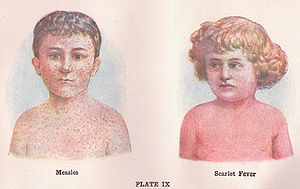 Image via Wikipedia
Image via WikipediaAn April 4, 2011 press release by the Department of Health
The Department of Health (DOH) today launched its month-long, nationwide, door-to-door measles vaccination campaign dubbed “Iligtas sa Tigdas ang Pinas,” which is targeting about 18 million children nine months to below eight years old.
“The main objective of the campaign is to reduce the number of susceptible children that have piled up since we last conducted a nationwide campaign last 2004,” Health Secretary Enrique T. Ona explained, adding that vaccination is the best way to prevent measles and German measles.
From April 4 to May 4, 2011, expect vaccination teams or “Bakunadoors” to be knocking at your door to give free measles and German measles vaccines to children aged nine months to below eight years old. The health department advises that parents submit eligible children for vaccination even if they have previous measles vaccinations or if they have already suffered from measles. Aside from vaccines, some local governments will also be giving out free capsules of Vitamin A, which is an important micronutrient for good eyesight, strong bones, and a healthy immune system.
From January to March 19 of this year, there were 2,075 measles cases nationwide recorded by the DOH National Epidemiology Center. There have already been five deaths recorded. Ages of cases ranged from eight days to 85 years old.
“It is alarming to know that there are still children dying from measles even if measles vaccination is free and available nationwide at all health centers,” Ona said.
Most of the cases came from the National Capital Region (311), Central Luzon (298), Bicol Region (277), CALABARZON (238), Davao Region (197), Ilocos Region (174), and Zamboanga Peninsula (163). At the National Capital Region, most cases came from Manila (101), Quezon City (50), and Caloocan (36).
Nationwide mass immunization campaigns such as this have enjoyed a better coverage rate than regular implementation of the Expanded Program of Immunization. Previous measles campaigns conducted in 2004 and 2007 both reached 95 percent coverage, a level never achieved by the regular programs. This prompted the DOH to implement the nationwide door-to-door strategy to fight off the threat of measles.
The door-to-door campaign was made possible through our partnership with the local government units who mobilized the vaccination teams as well as, our partners from the World Health Organization (WHO).
Measles is a highly contagious disease, which can be fatal. It is spread by coughing and sneezing, close personal contact, or direct contact with infected nasal or throat secretions. Immunity against measles is developed following vaccination.
Likewise, German measles, also known as rubella, is a highly contagious mild disease characterized by flu-like symptoms followed by a rash. Immunity against German measles is also developed following vaccination. However, the primary danger with rubella is the infection of pregnant women as it poses a serious threat to the life of the unborn. It may cause miscarriages, premature delivery, and serious birth defects, including heart problems, hearing and sight problems, cognitive impairment, and liver or spleen damage.
According to the World Health Organization (WHO), the measles-rubella vaccine is safe, effective and inexpensive.
“It costs between P500 to P15,000 to treat a child with measles, but preventing measles through vaccination is free. Let us have our children vaccinated against measles. Let us prevent deaths due to measles and its complication,” Ona concluded.






No comments:
Post a Comment